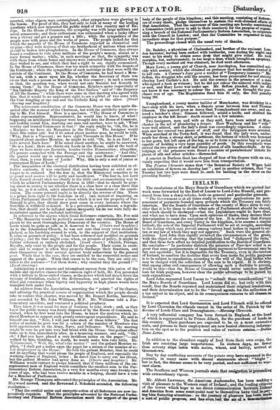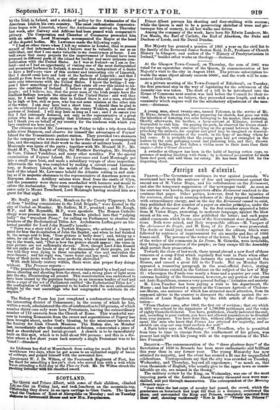IRELAND.
The resolutions of the Mayo Boards of Guardians which we quoted last week were forwarded by the Earl of Lucan to Lord John Russell, and pro- duced from him a sharp rebuke, both on. general and particular grounds.
"The Government is at all times ready to consider applications for post- ponement of payments founded upon grounds which the Treasury can fairly entertain.. But the Boards of Guardians of the county of Mayo seem to con- sider that it is for them to decide what acts of Parliament should be obeyed, and which. should be disobeyed—what the Legislature ought to have and what not to have done. Upon such opinions of theirs, they declare their determination to resist the execution of the law. It is obvious that if every Board of Guardians, and. every Vestry in the kingdom, into assume a similar latitude, the acts of the Imperial Parliament will be set at nought, according to the feeling which may prevail among various local bodies- in regard to any tax or any law of which they may not approve." Such were the general ob-
jections. Lord John then rapidly reviewed the circumstances of the grant, with the object of showing that the resolutions had "disfigured the facts,"
and that those facts afford Bo detailed justification to the Boards of Guardians.
He concludes—" In particular districts the pressure of Poor-law relief is so great that some postponements of immedia. te payment to Government may be
lair and equitable; but it is impossible for the Treasury, even in the interest of Ireland, to sanction the doctrine that every loan made for public purposes is to be subject to repudiation, according to the will of the local bodies who may he charged with the collection of the sum to be repaid. It is obvious that among other evil consequences of allowing such a doctrine to prevail; would be this—that the Rouse of Commons would never sanction amither loan for Irish purposes,. however clear the public advantage to be gained by such expenditure." Lord John requested Lord Lucan to "submit these considerations" to the Mayo Boards of Guardians. Lord Lucan did so ; but only with this
result, that the Boards repeated and, maintained their original resolutions, and their determination not to be the "forced agents for the collection of a tax unjust in its object, and in its consequences ruinous to all classes Ut Ireland.'
It is expected that Lord Gormanston and Lord Efrench will be offered by Lord Clarendon the xibands vacant in the order of St. Patrick by the decease of Lords Clare and Donoughmore.—Marning Chronicle.
A very influential company has been formed in England, at the head of which is represented to be Prince Albert, for the purchase of lands in this country. Their purchases are expected to be on a most extensive scale, and persons in their employment are now busied obtaining informa- tion on the spot as to the position and value of various estates. —Dablin _Yews Letter.
In addition to the abundant supply of food from their own crops, the Irish are receiving large importations. In sixteen days, no fewer than seventy ships laden with maize, wheat, and barley, arrived at Queenstown.
Day by day conflicting accounts of the potato crop have appeared in the journal; in many eases with dismal statements about "blight " ; but in fact, the disease seems to be very partial, and not sufficient to war- rant alarm.
The Southern and Western journals state that emigration is proceeding with extraordinary vigour.
Mr. Abbott Lawrence, the Americtui Ambassador, has been making malt of pleasure to the Western coast of Ireland s and the leading citiz ens of the towns which hope to see direct communication between Irelam) and America from some coast-point near to themselves have vied lit paY' lag him flattering attentions : so the journey of pleasure has been made a sort of public progress, and has even had the air of a deuxonstration by the Irish in Leland, and a stroke of policy by the Ambassador of the American Irish= his own country. The moot enthusiastic demonstra- tions began win Limerick, where the Ambassador arrived on Thursday last week, after Galway and Athlone had been passed with comparative privacy. Tie Corporation and Chamber of Commerce presented him with an aderess. Lord Monteagle accompanied the Mayor at the head of the depited bodies. Mr-. Lawrence made the following reply. hada° other views when I left my mission in London, than to possess myself of that information which I believe may be valuable to me as an individual, and that I can make valuable teary countrymen at home. I am well aware that many projects for the improvement of Ireland have been proposed in different parts of the island for further and more intimate com- munication with the United States. As! was in Ireland—as I am in Ire- land—and cs I had an opportunity of visiting one of the most distinguished and prominent harbours in Ireland, it seemed to me' independent of a desire to have a bird's-eye view of this ancient and interesting city of Limerick, that I shoeld come here and look at the harbour of Limerick; and that I should go from here to Cork, or any other place that should promise to pro- mote easy intercourse with the United States. I know the feeling—I sup- pose I Inner something of the feeling that exists all over this island to im- prove the condition of Ireland. I believe it pervades all classes of the people; end I believe, too, that the great mass of the Irish people have the eindliest feelings towards the citizens of the United States : and well they may, for I need hardly state that in Ireland there is not a man, whether he be lagh Or low, rich or poor, who has not some relation at the other side of the water. I can stay here but a short time. I should then be glad to see tie celebrated Lakes of Killarney, the county Wieklovr, and some other that I feel extremely fiatter not only as the representative of a greet portiona of Ireland. I will atsechere as long as I can ; and I do asaure you nation who has all the sympathy that Irishmen could desire for Ireland, bat I thank you on behalf of my country for the kindness with which you have received me here today." The citizens invited Mr. Lawrence on Friday to take a trip down their noble river Shannon, and observe for himself the advantages of Foynes' Island for the Transatlantic packet-station. They provided two steamers for the company who were anxious to have the honour of accompanying him, and the engines did their work to the music of military bands. Lord Monteagle was again of the party ; together with Mr. Monsen M.P., Mr. Geoid M.P.' The Knight of Glyn, Sir Matthew Barrington, Mr. Stephen de Fere, Colonel Vandeleur' and many other notables. For the special examination of Foynes' Island, Mr. Lawrence and Lord Monteagle got into a small open boat, and made a subsidiary voyage of close inspection. Afterwards the trip was completed by making a circuit round Laniscat- tem or Scattery Island, at the mouth of the Shannon and from the back of the island Mr. Lawrence beheld the Atlantic rolling in and sink- ing as if in majestic obeisance to the representative of American power on European shores. Artillery salutes were fired from the castle of Glyn, and the peasantry were there seen marshalled with banners and music to salute the Ambassador. The return voyage was prosecuted by Mr. Law- rence only to Mount Trenchard, Lord Monteagic having secured him as a guest for that night.
Mr. Scully and Mr. Maher, Members for the County Tipperary, both of them "holding commissions in the Irish Brigade," were &tested in the city of Cashel on Monday. Mr. Sadleir, M.P., presided; and Mr. Keogh, M.P., and Mr. Reynolds, M.P., were speakers. The Roman Catholic clergy were present en masse. Dean Bourke pitched into that "yelping
bully" the "truculent Times," for calling on Parliament to chastise the breakers of the Ecclesiastical Titles Act. Archdeacon Laffan gave an his- torical parallel for Lord John Russell's benefit- " There was a story- told of a Turkish Emperor, who ordered a limner to paint for him the decapitation of John the Baptist ; and when he had finished it, the savage said to him, 'Your picture is badly done '; and, taking up a sabre, he cut off the head of one of his slaves, who was near him and point- ing to the trunk, said, 'That is how the picture should appear : tie veins in your picture are not sufficiently shrunk.' Now, though Lord John Russell did not strike off the heads of any of the thousands of their people yet he was told they were dying in. those receptacles of vice and starvation the poor-houses; and his reply was, 'more water and leas meal,' and then the veins of their necks would be more perfectly shrivelled." With snch bloody oratory within, there were also proper fiery doings without. The .Freeman reports—
"The proceedings in the banquet-room were interrupted by a loud and voci- ferous cheering and shouting from the street, and a strong glare of light arose into the sky, illuminating all around. This manifestation was understood to have been caused by the populace burning in an immense bonfire of turf and sticks a copy of the act of Parliament entitled 'the Ecclesiastical Titles Act'; the conflagration of which appeared to be hailed with the most enthusiastic delight by the vast assemblage who had congregated to celebrate its ob- sequies."
The Bishop of Them has just completed a confirmation tour through the interesting district of Connemara; in the course of which he has, within a week, administered the rite of confirmationto 743 persons, of which number thirty-one only were born Protestants, leaving the extraordinary number of 712 converts from the Church of Rome. This wonderful suc- eess in turning Romanists from the errors and superstitions of Popery has been brought about, under God's blessing, by the missionary labours of the Society for Irish Church Missions. The Bishop also, on Monday last, immediately after the confirmation at Selema, consecrated a piece of land as churchyard and burial-ground. A church is to be immediately built on this spot, which is to hold about 900 persons : and this in a dis- trict where a few short years back scarcely a single Protestant was to be 'ound !—Standard.
An Irishman has died at Monntheath from eating too much. He had left workhouse two days, when he got access to an unlimited supply of bacon ed cabbage, and gorged himself with the unwonted faze.
Lieutenant W. J. De Wilton, of the Fourteenth Regiment of Foot, has bn fined for assaulting a lawyer's clerk who served hire with a writ while he-as attending a field-day in the Plies lie Park. Mr. De Wilton struck the Invoking intruder with his sheathed sword.



























 Previous page
Previous page